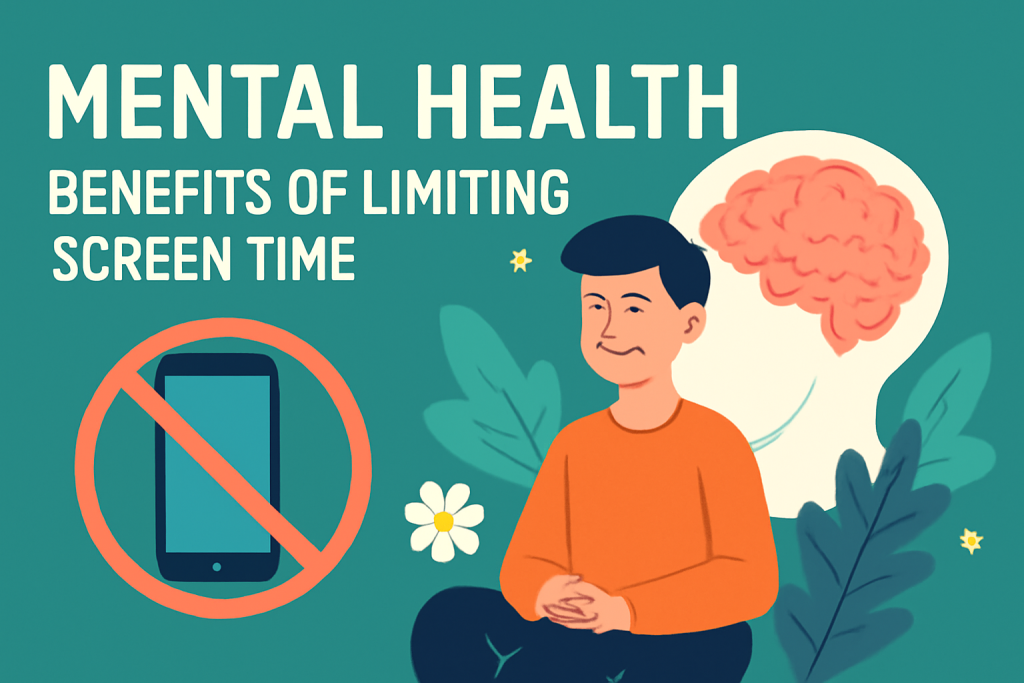
In today’s digital world, screens have become a fundamental part of our daily lives, whether for work, entertainment, or social connection. However, excessive screen time has been linked to a range of mental health concerns. Limiting screen time can have numerous benefits for mental well-being. Below are some key advantages of reducing screen exposure:
1. Reduced Stress and Anxiety
- Prolonged screen time, especially on social media, can lead to comparison, cyberbullying, and information overload. By limiting screen use, you can reduce these stressors, leading to a more balanced mental state. Research suggests that taking breaks from digital devices lowers anxiety levels and promotes a sense of calm.
2. Improved Sleep Quality
- The blue light emitted by screens interferes with the production of melatonin, the hormone responsible for regulating sleep. Reducing screen time, especially before bedtime, can help restore natural sleep patterns and improve sleep quality. Better sleep directly contributes to better mental health by enhancing cognitive functions and emotional regulation.
3. Better Focus and Productivity
- Constant notifications, multitasking, and digital distractions can make it difficult to concentrate. By limiting screen time, you allow yourself more focused, uninterrupted time for tasks, leading to increased productivity and mental clarity. This also helps to avoid feelings of overwhelm that can arise from trying to keep up with constant digital input.
4. Enhanced Emotional Well-Being
- Overuse of screens, particularly through social media, can negatively impact self-esteem and body image, especially when comparing yourself to others online. Reducing screen time can allow you to cultivate better self-esteem and engage in real-life interactions that nurture genuine emotional connections, fostering positive mental health.
5. Increased Mindfulness and Presence
- Limiting screen time opens up opportunities for mindfulness activities, such as outdoor walks, yoga, or simply being present in the moment. Engaging in activities that do not involve screens can help reduce stress, enhance mental clarity, and promote a sense of peace and well-being.
6. Reduced Risk of Digital Addiction
- Excessive screen use, especially when it becomes habitual, can contribute to digital addiction. By setting limits on screen time, you reduce the risk of developing unhealthy digital habits. This can improve your relationship with technology and prevent it from negatively impacting your mental health.
7. Better Social Connections
- While screens provide convenient means of communication, face-to-face interactions are vital for emotional health. By reducing time spent on devices, you can increase in-person socializing, leading to stronger social bonds and a greater sense of belonging, which is essential for mental well-being.
Conclusion
Limiting screen time is a simple yet effective strategy for improving mental health. It allows you to regain control over your digital habits, reduce stress and anxiety, and create space for healthier, more fulfilling activities. Whether it’s setting boundaries around screen use before bed, taking regular digital detoxes, or limiting social media exposure, the benefits for mental health are substantial.
Find Trusted Cardiac Hospitals
Compare heart hospitals by city and services — all in one place.
Explore Hospitals
Limiting screen time supports mental health because constant scrolling and notifications keep the brain in a “high-alert” state, which can increase stress, reduce attention span, worsen sleep quality, and quietly fuel anxiety and low mood over time. When you cut back—especially in the evening—you usually sleep faster, wake up less, and feel more emotionally stable the next day, because your mind gets real downtime instead of endless stimulation. A practical approach is to set “screen boundaries” rather than chasing perfection: keep phones away during meals, use a 30–60 minute no-screen wind-down before bed, turn off non-essential notifications, and replace short scrolling breaks with quick walks or stretching. Social media also affects self-image and mood through comparison, so reducing passive consumption and choosing more intentional use often improves confidence and focus. The goal is not to hate technology—it’s to use it on your terms so your brain gets space to rest, reset, and feel calmer.